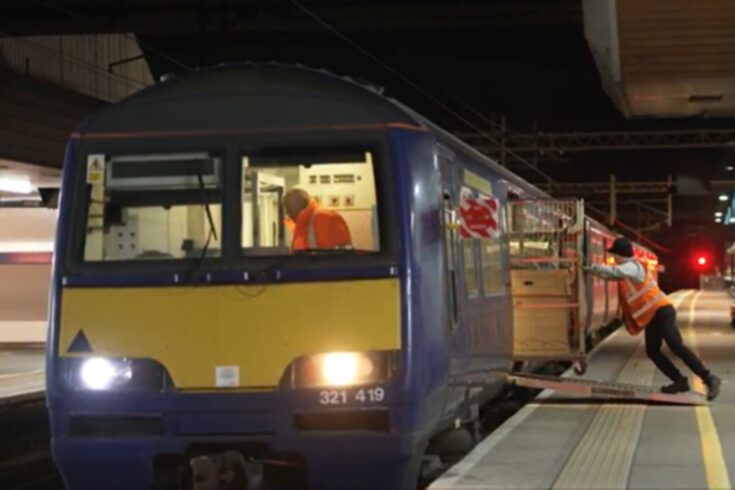Rail logistics experts, Varamis Rail, have partnered with parcel distribution and logistics companies. It aims to deliver a transformative parcel conveyance service using repurposed passenger stock, helping to support the growth of electric rail freight transport in the UK.
In support of UK low emissions targets, a diversification from road transport to include other forms, such as rail, can see significant benefits. This includes improvements not only in like-for-like emissions, but also in delivery times, reliability and cost for users.
Changing consumer habits and demands from manufacturing businesses mean that goods and parcels are expected faster and by more environmental means. However, the UK currently lacks a meaningful alternative to road transport that can meet this demand.
Transforming high speed rail logistics
The project’s aim was to test and demonstrate not only the viability of a rail freight prospect, but also that it will:
- provide benefits against cost, time and emissions benchmarks
- avoid disruption to existing rail timetables and logistics
The other key element is to demonstrate the capability of a fully-electrified rail asset that can effectively replace and even improve the performance of a diesel-powered unit, offering a truly zero-emission solution.
By demonstrating the capabilities of the concept across a defined route, and its reliability of delivery, the project will unlock the customer demand that has been waiting for its commercialisation.
The project scope
The project is led by Varamis Rail, with support from Network Rail and Eversholt Rail Group among others. It looked to successfully deliver a zero-emission rail freight route that would fit seamlessly into the existing rail network and support longer-term objectives to diversify parcel distribution from road use.
With initial preparatory work already completed, the project purchased and refurbished older rolling stock that still had many years of use but had been superseded on the network. Varamis then fitted an all-electric power solution to replace any diesel requirements and renovated the inside to remove passenger furniture and replace it with parcel storage and roll-cage fixings.
The project then began its route testing demonstration work, running a non-stop service in the early hours of the morning, five nights a week between Birmingham and Glasgow. The results not only showed a successful journey completion within the confines of the passenger service timetable, but also that the electric power unit was capable of delivering speeds that would mean no existing high-speed trains would end up catching and being impacted by the service.
Results saw a 95% reliability of arrival within 15 minutes of the expected time, easily exceeding reliability benchmarks to be able to compete with traditional road routes, while also showcasing the lower cost and emission opportunities.
Looking at the impact of the funding received, Phil Read, CEO at Varamis Rail, said:
Having the backing of the FOAK initiative, with Innovate UK and the DfT playing such a key role, really gave us the credibility to push the project concept forwards to the market. Not only did the funding provide valuable resource for the demonstration phase, but the support we gained also brought us closer to new project partners, potential customers, and outside investors as well.
What happened next
Following the success of the work within the project scope, the concept has now raised a further £1.7 million through Angel Investors. Also, a second new customer has been signed up, involving one of the UK’s biggest names in parcel delivery and logistics.
To meet growing demand, up to 10 new trains are being bought to be refitted, meaning a second train service can be delivered, and a greater number of freight carriages deployed.
This success has meant that now more than 30 people are working on the service, from drivers and manual roll-cage and parcel operatives, to operations and planning staff.
Varamis is also committed to further improvements and expansion of the concept. A target of 98% reliability of arrival within 15 minutes has been set, while the company is also continuing its work on communicating with the rail and freight sectors. This includes further education on the concept and its potential.
About the funding
The project forms part of the FOAK demonstrator initiative, which aims to accelerate innovation in the UK rail sector and enable new technology to be readily and efficiently integrated into the railway system. This project was successful under the ‘rail freight’ funding theme.
The FOAK initiative is intended to:
- support innovation solutions at high technology readiness levels in their route to market
- deliver scalable rail solutions that lead to deployment and real-world demonstrations
FOAK is a Small Business Research Initiative (SBRI) competition funded by the Department for Transport and delivered in partnership with Innovate UK. As part of the FOAK 2022 initiative, over £6 million was allocated to 24 projects from across the UK, helping to deliver demonstrations and feasibility studies to tackle key challenges within the sector.
This project is just one example of how Innovate UK and its partners are investing to realise the vision for rail in the Transport Vision 2050 strategy document. The strategy document sets out what the UK transport system may look like in 2050, and outlines the likely steps along the way to achieving this. Innovate UK and its partners are currently investing around £700 million in the current three-year spending review period in transport programmes covering the pathways set out in the Transport Vision document.

